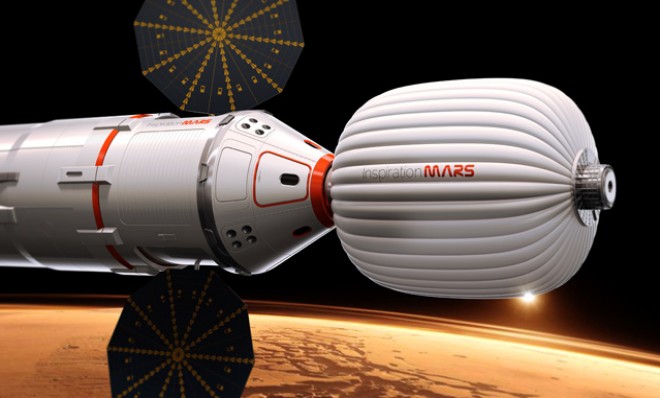The audacious plan to send a husband-and-wife team to Mars
The couple would live in super-tight quarters for 501 days


A free daily email with the biggest news stories of the day – and the best features from TheWeek.com
You are now subscribed
Your newsletter sign-up was successful
The Inspiration Mars Foundation, a private, nonprofit group, on Wednesday announced an ambitious project to send two people — preferably husband and wife — to Mars in 2018. The project, dubbed "Mission for America," is the brainchild of multi-millionaire Dennis Tito, a former NASA engineer who became the first space tourist in 2001 when he paid a cool $20 million to visit the International Space Station.
The basic idea is that the couple will navigate a privately financed spaceship to Mars and back, using the Red Planet's gravitational field to whip the ship back to Earth like a slingshot. The ship will come within 100 miles of the planet, but will not touch down, nor gather the type of data that NASA's Curiosity rover is currently collecting. The point of the mission, according to Tito, is largely inspirational. "This 'Mission for America' will generate new knowledge, experience and momentum for the next great era of space exploration," the foundation said in a statement. "It is intended to encourage all Americans to believe again, in doing the hard things that make our nation great."
Why husband and wife? "This is very symbolic and we really need it to represent humanity with a man and a woman," Tito says.
The Week
Escape your echo chamber. Get the facts behind the news, plus analysis from multiple perspectives.

Sign up for The Week's Free Newsletters
From our morning news briefing to a weekly Good News Newsletter, get the best of The Week delivered directly to your inbox.
From our morning news briefing to a weekly Good News Newsletter, get the best of The Week delivered directly to your inbox.
And because sex. "When you're out that far, and the Earth is a tiny, blue pinpoint, you're going to need someone you can hug," Tito admits. The couple will be ensconced in a two-room capsule of about 600 cubic feet — roughly half the size of an RV — for 501 days.
Tito and his crew, however, will face numerous unknowns as they prepare for the voyage. First, it's not entirely clear the astronauts will be able to withstand the radiation that permeates space for such a long period of time. As Ian Sample at The Guardian writes:
There are energetic cosmic rays that zip through spaceship hulls. Dozing astronauts have reported seeing flashes of light through unopened eyes, as cosmic rays strike their retinas. The radiation takes its toll on the body, causing gradual damage to certain organs, raising the risk of cancer, and perhaps accelerating Alzheimer's disease. [The Guardian]
Indeed, Tito is reportedly looking for a man and a woman who are past childbearing years, and willing to risk contracting cancer.
In addition, the astronauts could suffer from prolonged weightlessness, which tends to atrophy the muscles, leading to a weak heart, thinning bones, and numerous side effects.
A free daily email with the biggest news stories of the day – and the best features from TheWeek.com
And while zero-gravity sex may sound kind of amazing, the lucky couple won't be flying in the most romantic of settings. According to the Associated Press:
The trying circumstances include: No showers, limits on toilet paper and clothing, drinking water made from the crew members’ recycled urine and sweat, and almost no privacy. [Associated Press]
If you're wondering whether there is any couple willing to drink each other's urine and sweat for a glimpse of Mars and space sex, look no further than Tabor MacCallum and Jane Poynter, a married couple who are a member of Tito's planning team. They have already put their names up for contention.
Experts say Tito's plan is riskier than anything NASA would ever approve. But at an estimated cost of $1 billion, it will also be cheaper than the Curiosity's $2.5 billion price tag. For now at least, it appears all systems are go.
Ryu Spaeth is deputy editor at TheWeek.com. Follow him on Twitter.
-
 6 of the world’s most accessible destinations
6 of the world’s most accessible destinationsThe Week Recommends Experience all of Berlin, Singapore and Sydney
-
 How the FCC’s ‘equal time’ rule works
How the FCC’s ‘equal time’ rule worksIn the Spotlight The law is at the heart of the Colbert-CBS conflict
-
 What is the endgame in the DHS shutdown?
What is the endgame in the DHS shutdown?Today’s Big Question Democrats want to rein in ICE’s immigration crackdown